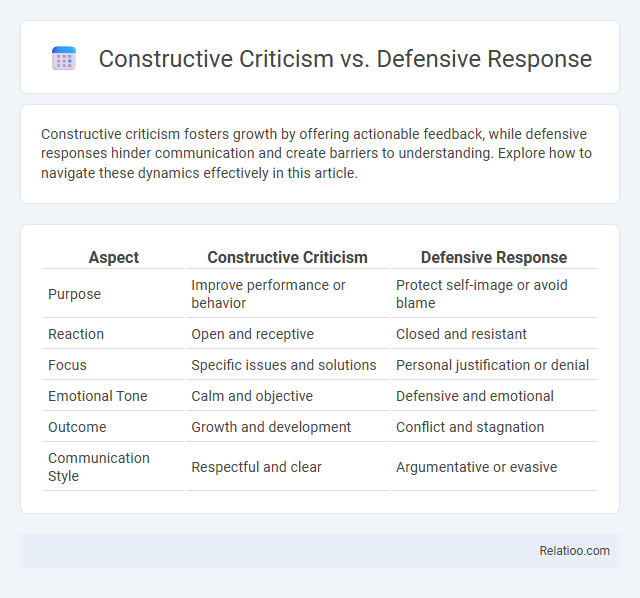Constructive criticism fosters growth by offering actionable feedback, while defensive responses hinder communication and create barriers to understanding. Explore how to navigate these dynamics effectively in this article.
Table of Comparison
| Aspect | Constructive Criticism | Defensive Response |
|---|---|---|
| Purpose | Improve performance or behavior | Protect self-image or avoid blame |
| Reaction | Open and receptive | Closed and resistant |
| Focus | Specific issues and solutions | Personal justification or denial |
| Emotional Tone | Calm and objective | Defensive and emotional |
| Outcome | Growth and development | Conflict and stagnation |
| Communication Style | Respectful and clear | Argumentative or evasive |
Understanding Constructive Criticism
Understanding constructive criticism involves recognizing feedback aimed at improving performance or behavior without personal attack, fostering growth and learning. Constructive criticism is specific, actionable, and delivered with empathy, making it easier to accept and apply effectively. In contrast, a defensive response or defensiveness arises from perceiving criticism as a threat, often leading to dismissiveness or argument rather than productive reflection.
Defining Defensive Responses
Defensive responses occur when You perceive feedback as a personal attack, triggering emotional reactions that hinder objective evaluation. Unlike constructive criticism, which aims to improve performance through specific, actionable insights, defensive responses often involve denial, justification, or counterattacks that block productive communication. Understanding defensive responses is essential for fostering open dialogue and personal growth in both professional and personal settings.
Key Differences Between Criticism and Defensiveness
Constructive criticism aims to provide specific, actionable feedback intended to foster improvement, while defensiveness is a psychological reaction characterized by denial, avoidance, or justification in response to perceived criticism. Your ability to differentiate between constructive criticism and defensiveness impacts communication effectiveness, as constructive feedback invites growth, whereas defensiveness often hinders problem-solving and escalates conflicts. Understanding these key differences enables you to respond thoughtfully, enhancing interpersonal relationships and promoting personal development.
Psychological Roots of Defensive Behavior
Constructive criticism fosters personal growth by addressing behaviors without attacking identity, whereas defensive response arises from perceived threats to self-esteem rooted in psychological needs for safety and acceptance. Defensiveness often stems from deep-seated fears of judgment, rejection, or vulnerability, triggering instinctual emotional protection mechanisms in your brain. Understanding these psychological roots helps manage defensive behavior, promoting openness and resilience in face of feedback.
Benefits of Embracing Constructive Feedback
Embracing constructive criticism enhances your personal and professional growth by providing actionable insights that foster continuous improvement and stronger relationships. Unlike defensive responses or general defensiveness that hinder progress and create barriers, constructive feedback promotes self-awareness and problem-solving skills. You can leverage this positive mindset to enhance communication, boost performance, and cultivate a collaborative environment.
Common Triggers of Defensive Responses
Common triggers of defensive responses include feeling personally attacked, receiving vague or non-specific feedback, and perceiving criticism as a threat to self-esteem. Constructive criticism aims to provide actionable insights without judgment, helping you improve while minimizing emotional reactions. Recognizing these triggers allows you to manage defensiveness, fostering more productive and open communication.
Effective Strategies for Giving Constructive Criticism
Effective strategies for giving constructive criticism involve focusing on specific behaviors rather than personal traits, ensuring feedback is clear, actionable, and supportive to promote positive change. Framing criticism with empathy and using "I" statements reduces the likelihood of triggering a defensive response and defensiveness, fostering open communication and trust. Encouraging dialogue and active listening enables recipients to engage with feedback constructively, enhancing personal and professional growth.
How to Respond Gracefully to Feedback
Gracefully responding to feedback involves distinguishing constructive criticism from personal attacks and avoiding defensive responses that hinder growth. You can focus on understanding the specific points being raised, asking clarifying questions, and expressing appreciation for the opportunity to improve. Practicing active listening and maintaining a calm, open mindset fosters positive communication and encourages ongoing professional development.
Impact of Defensive Responses in Relationships
Defensive responses in relationships often escalate conflicts by shutting down open communication and fostering misunderstanding between partners. This reactive behavior blocks constructive criticism, preventing individuals from addressing issues and growing together. Over time, persistent defensiveness undermines trust and emotional intimacy, leading to increased relationship dissatisfaction and potential breakdown.
Mindset Shifts for Growth and Improvement
Constructive criticism fosters growth by encouraging a growth mindset that views feedback as an opportunity for learning rather than a personal attack. Developing awareness of defensive responses allows individuals to manage emotional reactions and engage objectively with critiques, improving self-awareness and adaptability. Embracing mindset shifts from defensiveness to openness cultivates resilience, enhances communication, and drives continuous personal and professional improvement.

Infographic: Constructive Criticism vs Defensive Response
 relatioo.com
relatioo.com